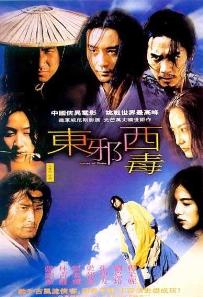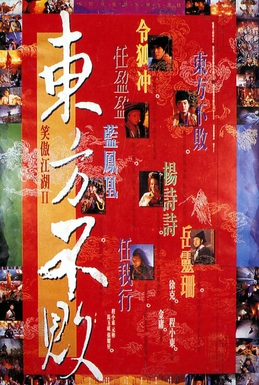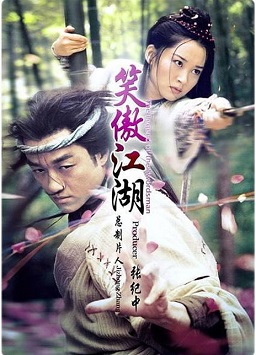
Ashes of Time is a 1994 Hong Kong film written and directed by Wong Kar-wai, and inspired by characters from Jin Yong's novel The Legend of the Condor Heroes.

The Central Academy of Drama is a national public drama school in Beijing, China. It is affiliated with the Ministry of Education. The academy is part of the Double First-Class Construction.

The Smiling, Proud Wanderer is a wuxia novel by Jin Yong. It was first serialised in Hong Kong in the newspaper Ming Pao from 20 April 1967 to 12 October 1969. The Chinese title of the novel, Xiao Ao Jiang Hu, literally means to live a carefree life in a mundane world of strife. Alternate English translations of the title include The Wandering Swordsman, Laughing in the Wind, The Peerless Gallant Errant, and The Proud and Gallant Wanderer. Another alternative title, State of Divinity, is used for some of the novel's adaptations.

Swordsman II, also known as The Legend of the Swordsman, is a 1992 Hong Kong wuxia film very loosely adapted from Louis Cha's novel The Smiling, Proud Wanderer. It was the second part of a trilogy: preceded by The Swordsman (1990) and followed by The East Is Red (1993). Directed by Ching Siu-tung, Swordsman II starred Jet Li, Brigitte Lin, Rosamund Kwan and Michelle Reis in the leading roles. None of the original cast from the previous film return except Fennie Yuen.

Laughing in the Wind is a 2001 Chinese television series produced by Zhang Jizhong, starring Li Yapeng and Xu Qing in the leading roles. The series is an adaptation of Louis Cha's novel The Smiling, Proud Wanderer. It was first broadcast on CCTV in China in 2001.

Dongfang Bubai, literally "Invincible East", is a fictional character in the wuxia novel The Smiling, Proud Wanderer by Jin Yong. He is the leader of the Sun Moon Holy Cult (日月神教), an "unorthodox" martial arts school. In his quest to dominate the wulin, he castrated himself to fulfil the prerequisite for learning the skills in a martial arts manual known as the Sunflower Manual (葵花寶典), and became a formidable martial artist after mastering those skills. His castration and supreme prowess in martial arts make him one of the most memorable characters in Jin Yong's wuxia universe even though he appears in only one chapter of the novel. His name has also become virtually synonymous with homosexuality and LGBT sexual orientations in Chinese popular culture.
The Mount Hua Sect, also known as the Huashan Sect, is a fictional martial arts sect mentioned in several works of wuxia fiction. It is commonly featured as one of the leading orthodox sects in the wulin. It is named after the place where it is based, Mount Hua. The sect appears in three of Jin Yong's novels.
The Five Mountain Sword Schools Alliance is a fictional alliance formed by five "orthodox" martial arts schools in the wuxia novel The Smiling, Proud Wanderer by Jin Yong. The five schools specialise in swordplay and are based on the Five Great Mountains in Taoism: Mount Hua, Mount Tai, (South) Mount Heng, (North) Mount Heng and Mount Song. The alliance was initially established to counter the "evil" Sun Moon Holy Cult. However, as the story progresses, the alliance ultimately disintegrates due to mutual distrust and infighting.

The Legendary Swordsman is a Singaporean television series adapted from Louis Cha's novel The Smiling, Proud Wanderer. It was first broadcast on TCS-8 in Singapore in 2000. It stars Steve Ma, Fann Wong, Ivy Lee, Chew Chor Meng, Jacelyn Tay, Florence Tan, Chen Tianwen, Priscelia Chan & Zheng Geping as the casts of the series.

State of Divinity is a Taiwanese television series adapted from Louis Cha's novel The Smiling, Proud Wanderer. It was first broadcast on CTV in Taiwan in 2000.
The Proud Youth is a 1978 Hong Kong film loosely based on Louis Cha's novel The Smiling, Proud Wanderer. It was produced by the Shaw Brothers Studio, directed by Sun Chung and starred Wong Yue, Shih Szu, Michael Chan and Ling Yun.

The Brave Archer 2, also known as Kungfu Warlord 2, is a 1978 Hong Kong film adapted from Louis Cha's novel The Legend of the Condor Heroes. The film was produced by the Shaw Brothers Studio and directed by Chang Cheh, starring Alexander Fu Sheng and Niu-niu in the lead roles. The film is the second part of a trilogy and was preceded by The Brave Archer (1977) and followed by The Brave Archer 3 (1981). The trilogy has two unofficial sequels, The Brave Archer and His Mate (1982) and Little Dragon Maiden (1983).

Chor Lau-heung is a Taiwanese television series adapted from Chu Liuxiang Xinzhuan of Gu Long's Chu Liuxiang novel series. Adam Cheng starred as the titular protagonist, Chor Lau-heung. The series was divided into four parts, each lasting 4 to 6 episodes and with a different director. It was first broadcast on CTV in Taiwan in 1985. The series is an unofficial sequel to the 1979 Hong Kong TVB TV series of the same title, with the story continuing from where the 1979 series left off. The character Su Rongrong does not appear in this series because the character died at the end of the 1979 series.

Return of the Sentimental Swordsman, also known as The Flying Blade, is a 1981 Hong Kong wuxia film written and directed by Chor Yuen and produced by the Shaw Brothers Studio, based on Gu Long's Xiaoli Feidao series of novels. It stars Ti Lung, Alexander Fu Sheng and Derek Yee.

Justice Bao is a Chinese TV series starring producer Jin Chao-chun as the Song dynasty official Bao Zheng. The series ran for 3 seasons from 2010 to 2012. In addition to Jin, Kenny Ho, Fan Hung-hsuan and Lung Lung again reprise their iconic roles from the 1993 Taiwanese hit Justice Pao and the 2008 Chinese series Justice Bao.

Swordsman is a 2013 Chinese television series adapted from Louis Cha's novel The Smiling, Proud Wanderer. The series is written and produced by Yu Zheng, and stars Wallace Huo, Joe Chen, Yuan Shanshan, Chen Xiao and Yang Rong. Shooting started on 24 March 2015 in Xiandu, Jinyun County, Lishui, Zhejiang. It was first aired in China on Hunan Television from 6 February to 4 March 2013. The plot deviates significantly from the novel, with Dongfang Bubai depicted as a woman and having a romantic affair with Linghu Chong.












